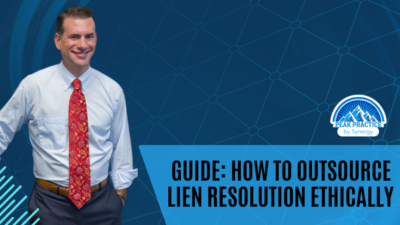Trial lawyers already juggle proving liability, causation, and damages in a personal injury case. But when settlement rolls around, another layer of complexity often arises: healthcare lien resolution.
Just as attorneys routinely outsource to experts in areas like accident reconstruction, life care planning, probate matters, special needs planning or Medicare compliance, it’s not only permissible—but often smart—to outsource lien resolution to specialized professionals who understand the inside baseball.
Here’s how to do it ethically, efficiently, and to your client’s benefit
Why Outsource Lien Resolution?
- It’s Complex Medicare, Medicare Advantage, ERISA, Medicaid, FEHBA—many cases involve multiple liens from various providers. Missteps here can lead to litigation, malpractice, or even personal liability for double damages under the Medicare Secondary Payer Act.
- It’s Ethical—If Done Right ABA Model Rules (1.1, 1.5, 1.15, and Ethics Opinion 08-451) support outsourcing when: You retain ultimate responsibility Confidentiality is protected Fees are reasonable and disclosed Clients give informed consent
- It Helps Your Clients Skilled lien negotiators often secure deep reductions—maximizing your client’s net recovery. That’s the definition of making a difference.
State-Specific Rules for Outsourcing – New York as an Example:
Some states have developed specific rules that address ethical outsourcing of lien resolution, but many have yet to do so. For practitioners in states that have not done so, New York’s rules are a great guideline to follow. New York allows personal injury lawyers to outsource lien resolution and charge the cost to the client, but only if:
· The retainer agreement discloses the possibility, and the client gives informed consent;
· The fee is reasonable and passed through at cost (no markups);
· The outsourcing results in a net benefit to the client;
· The arrangement complies with all legal fee regulations;
· The lawyer retains responsibility for the final work.
How to be Compliant?
So, in summary, before outsourcing, make sure you update your retainer agreement to clearly state lien resolution may be outsourced, and that your client agrees to it. Make sure to get informed consent by walking the client through what outsourcing entails and the benefit to them. Ensure that the charges are reasonable with no markup by passing costs through at actual value, no surcharges. Some states allow these fees as case expenses but check your local rules. A necessary step is to vet potential lien resolution partners by doing your due diligence to make sure they are competent, trained, and trustworthy like synergy. Lastly, and importantly, you must supervise the work. Direct oversight = ethical compliance. Stay engaged with the process.
Key Takeaway
Outsourcing lien resolution is not just smart—it’s often essential. It protects clients, shields your firm from liability, and levels the playing field against well capitalized and skilled subrogation recovery vendors. If you are ready now to partner with synergy. and outsource healthcare lien resolution to the pros, visit https://partnerwithsynergy.com/liens/ today!
https://www.linkedin.com/pulse/guide-how-outsource-lien-resolution-ethically-jason-d–fyzme

